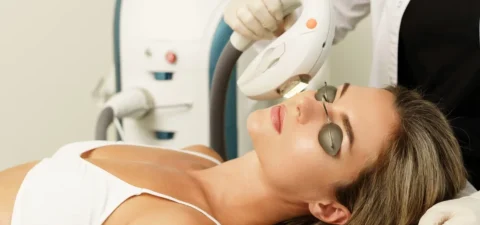For information only. Not meant as advice in any form. Please consult your medical professional or lawyer.
Cosmetologists and estheticians are professionals who work closely with clients who want to enhance the appearance of the skin. Normally, an aspiring skin care specialist only needs to have a high school diploma or GED to be able to apply in an esthetician or cosmetology program. However, there’s also an option to enroll in a vocational or beauty school to complete an associate’s degree in applied science in cosmetology or esthetics.
So how long does it take to finish a cosmetology degree or esthetician program in an accredited college? Those who are planning to get an associate’s degree can expect to undergo formal education and training for at least 2 years. After studying, they can obtain their esthetician or cosmetology license and practice in a salon or aesthetic spa.
How Many Years of College To Be A Cosmetologist and Esthetician
The huge interest in the beauty culture in the United States doesn’t only come from the individuals who wish to improve their skin and achieve their most beautiful self. There are also a number of people who want to pursue a career in the beauty industry. According to the US Bureau of Labor Statistics, the job outlook for cosmetologists and estheticians is projected to rise by 11% and 17% respectively in the next 10 years.
Being a licensed cosmetologist or esthetician means you have to be proficient in the art, science, and practice of skin care. While you don’t necessarily need a particular college degree to become a facial specialist, you still have to receive formal training and study the concepts related to cosmetology and esthetics.
One way you can qualify for a cosmetology or esthetician license is to obtain an applied science degree from a state-licensed beauty school or technical college. An associate’s degree in applied science (AAS) in cosmetology usually takes 2 years to complete. This program teaches cosmetology students the basics of proper hair, skin, and nail care. It also provides hands-on training on common procedures and services that they’re expected to perform in a work setting.
How Long A Cosmetology or Esthetician Program Usually Takes
Aside from enrolling to get an AAS degree in cosmetology, you can also get a certificate from an esthetician school approved by the National Accrediting Commission of Career Arts and Sciences. The timeline for completing an esthetician or cosmetology program depends on the required training hours and licensing qualifications per state.
Generally, individuals are required to finish an average of 1,400 to 1,600 cosmetology training hours to obtain a license. On the other hand, aspiring estheticians need to clock in at least 600 to 1,000 training hours to qualify for licensure. Some states may also instruct you to get relevant working experience under a licensed esthetician or cosmetologist on top of the hours in your program.
If you want to pursue a specialization, you’ll have to enroll in a special program which will take another set of training hours and education. For example, you should finish at least 600 hours to be a certified electrologist, 200 to 300 hours to be a nail technician, and an average of 1,500 hours to become a hairstylist.
What To Expect from an Esthetician or Cosmetology School
The exact curriculum of your esthetician or cosmetology instructor training program varies depending on the institution you attend. One thing you can be sure of is that the training course will equip you with the practical skills and knowledge to be a competent cosmetologist or skin care specialist.
Here’s an overview of what you can expect to learn from a cosmetology or esthetician school:
- Fundamentals of hair coloring, hair styling, and hair cutting
- Techniques in makeup application for beautification
- Advanced nail technology for enhancement and caring of nails
- Hair removal methods, such as waxing, laser, and threading
- Basics of skin care services, including facials, chemical peels, microdermabrasion, and light therapy
- Study of skin conditions and anatomy of the face
- Analysis of different skin types
- Chemistry and formulation of skin care products and how to make proper recommendations
- Safety, health, and sanitation protocols
Requirements to Apply For Cosmetology or Esthetician Training School
You should always check with your state board and the school to know the exact requirements needed to enroll in a cosmetology or esthetician program. To become an esthetician or cosmetology student, the general prerequisites are that you should have a high school diploma or GED and be of legal age which is between 16 to 18.
If you’ll be depending on financial aid to pay for your cosmetology or esthetics education, you may also be required to submit the forms upon application. You should also be prepared to have an interview with the admissions officer. Some institutions may also require you to pass an aptitude test or written exam to complete your application.
How To Obtain Your Cosmetologist or Esthetician License
The licensing requirements for a cosmetologist or esthetician vary per state so you should review the regulations and qualifications stated by the board. Typically, when you apply for licensure, you have to submit proof that you’ve completed the required training hours and finished a state-accredited program.
Once the board has reviewed your application, the next step in most states is to take a written and practical exam. You’ll need to pass both the written and hands-on tests to attain your cosmetology or esthetician license. If you fail, check with your state if they allow reexamination and apply to take the test again.
After receiving your license, you can begin working in a salon or medical spa setting. In some cases, you’ll have to pursue continuing education to increase your skills and qualify for renewal once your license expires.
Is the Work of Cosmetologists and Estheticians the Same?
It’s common for some people to use cosmetologist and esthetician interchangeably, especially when referring to professions related to beauty and skin care. Although they work in the same industry, there are significant differences in the scope of responsibilities and services that they can provide.
Here’s a table showing the comparison between an esthetics and cosmetology career:
| Licensed cosmetologist | Licensed esthetician | |
| Job description | Cosmetologists provide a wide range of services related to the enhancement of the hair, nail, and skin. | Estheticians provide treatments that are more focused on skin improvement and can help address different skin conditions. |
| Common responsibilities and services | They can perform basic skin treatments, hair styling, shampooing, cutting, nail services, hair braiding, and makeup application. | Some of the usual treatments that an esthetician can provide are facials, skin exfoliation, chemical peels, laser or light therapy, and hair removal. |
| Salary outlook | A cosmetologist can earn an average of $58,502 per year or $25.20 per hour | The estimated annual salary for estheticians is $50,571, while the hourly wage is $27.77. |
| Work opportunities | Cosmetologists usually work in beauty salons, barbershops, spas, resorts, or hotels. They can be employed as a hairstylist, salon or spa manager, nail technician, or makeup artist. | They can work in salons, day spas, medical spas, wellness clinics, and dermatology offices. With an esthetician license, they can be employed as a hair removal specialist, spa technician, and eyebrow or eyelash specialist. They can also further their career by training to be a master esthetician or medical aesthetician. |
Enhance Your Skills With Online Training Courses For Estheticians at FACE Med Store
The journey to becoming a cosmetologist or esthetician involves several steps that require your perseverance and willingness to invest your time. Generally, it can take at least 2 years for you to finish a specialized degree in cosmetology or at least 600 hours of training in an esthetician program.
You can also supplement your training with online aesthetic courses from FACE Med Store. We have a selection of comprehensive modules that can help improve your knowledge and skills as a cosmetologist or esthetician. We also provide high-quality medical tools and supplies to hundreds of our partner medical spas, aesthetic clinics, and healthcare facilities. For more information about our training courses or other stocks, don’t hesitate to call us today.






